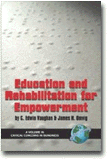
Education and Rehabilitation for Empowerment
Edited by:
Ed Vaughan
James H. Omvig, Institute on Blindness - Louisiana Tech University
A volume in the series: Critical Concerns in Blindness. Editor(s): Edward C. Bell, Louisiana Tech University.
Published 2005
In this book we are interested in patterns of education, rehabilitation service, socialization, and ideas about blindness that in large part produce the above-mentioned distinct patterns. We will examine the economic interests of professional groups and the patterns of domination and subordination, which are present in most rehabilitation relationships. Our central tenet is that the behavior of blind people is not a product of the physical condition of blindness or the amount of residual vision a blind person has. Rather, the behavior of blind people in our society is governed by socialization. Blindness is a social problem arising from erroneous, socially constructed negative beliefs about the capacities of blind people involuntarily assimilated from the broader society by the blind. People learn to live independently or they learn to be dependent. The reactions of parents, teachers, peers, the health professionals, rehabilitation counselors and the general public have defined the choices available to blind people. This is the case in every culture and society around the world. Differences result from different cultural values, levels of economic development, and historical traditions.
CONTENTS
Introduction. The Plan Of The Book. Rehabilitation. Ingredients Of Empowerment. The Professional Worker And The Road To Empowerment. Characteristics Of A Model State Agency. Blending In. Communication And Empowerment. Mobility. Sumary. References.
-
Paperback978-1-59311-006-2
Web price: $45.04 (Reg. 52.99)
-
Hardcover978-1-59311-007-9
Web price: $80.74 (Reg. 94.99)
- eBook9781607526742

- POL019000 - POLITICAL SCIENCE: PUBLIC POLICY: Social Services & Welfare
- EDU000000 - EDUCATION: General
-
 Accessible Education for Blind Learners
Kindergarten through Post-Secondary
Accessible Education for Blind Learners
Kindergarten through Post-Secondary
-
 Encyclopedia of Sports & Recreation for People with Visual Impairments
Encyclopedia of Sports & Recreation for People with Visual Impairments
-
 Getting Ready for College Begins in Third Grade
Working Toward an Independent Future for Your Blind/Visually Impaired Child
Getting Ready for College Begins in Third Grade
Working Toward an Independent Future for Your Blind/Visually Impaired Child
-
 Independent Movement and Travel in Blind Children
A Promotion Model
Independent Movement and Travel in Blind Children
A Promotion Model
-
 Structured Discovery Cane Travel Approach to Orientation and Mobility Concepts
Structured Discovery Cane Travel Approach to Orientation and Mobility Concepts
-
 The ABCs of Structured Discovery Cane Travel for Children
The ABCs of Structured Discovery Cane Travel for Children
-
 The Blind Need Not Apply
A History of Overcoming Prejudice in the Orientation and Mobility Profession
The Blind Need Not Apply
A History of Overcoming Prejudice in the Orientation and Mobility Profession

